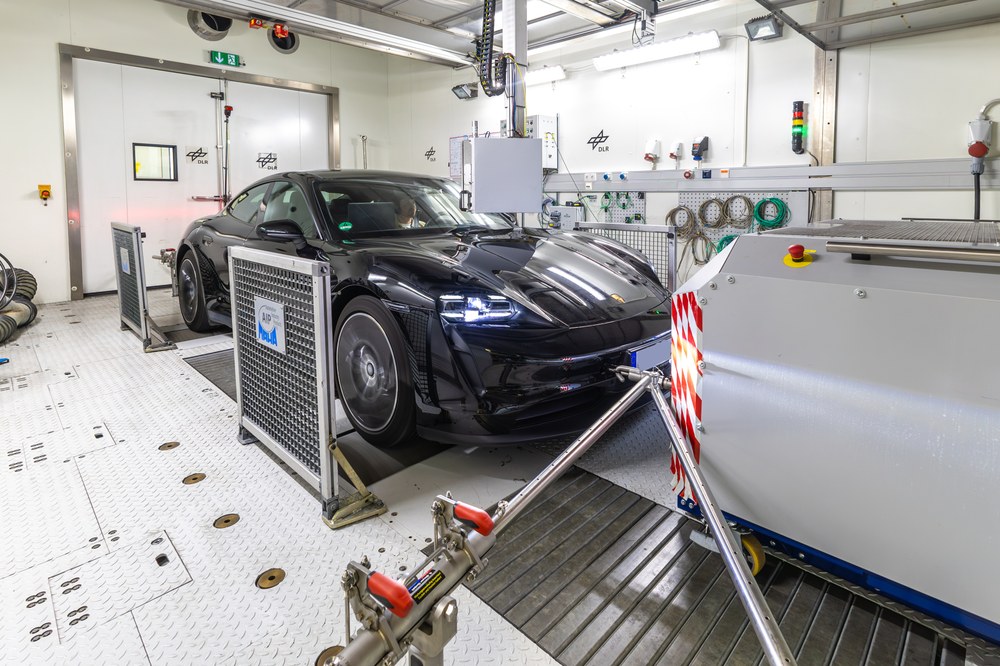Four-engine All-wheel Roller Rig with Climate Control

State-of-the-art test conditions for future vehicles
Air-conditioned four-wheel roller test bench for hydrogen vehicles and emission measurements: Research on modern drive systems under research conditions
The extensively equipped test bench is specialised on researching and developing new drive concepts for research vehicles. Cars of all classes up to vans can be tested on the roller climate test bench. The test bench allows the operation of vehicles with all liquid and gaseous fuels such as hydrogen and natural gas, paired with consumption measurement. For long life endurance tests a complete hydrogen supply is available on site.
The energy efficiency of the vehicle drives can be tested for all standard and specifically defined driving cycles, including gradients. The emission behavior can also be tested in real drive conditions. The driving resistance can be simulated under different road conditions and journeys under load or with a trailer can be simulated.
Performance
- Four individually driven 48″ rollers
- 100kW continuous power each
- Front, rear or all-wheel drive concepts
- Wheelbase from 1.6m to 4m
- Total weight of 4.5 tonnes
- maximum speed 200km/h
- Regulated airflow up to 137km/h
- air conditioning from -40°C to +60°C
- relative humidity from 20% to 80%

auto motor sport


Benefits
- Carrying out research work on vehicles with with conventional, electric or hydrogen or or hydrogen or natural gas drives
- Development of new concepts for future vehicle drives under state-of-the-art conditions
- Testing of vehicles together with partners in customer projects, test bench as a service
- Verification of newly designed and/or simulated technologies for alternative energy conversion
- Interactive networking of innovative energy storage systems in the drivetrain
- Development of regulation and control concepts as well as operating strategy
Key technical data and performance
Fuel consumption and range measurement: Fuel consumption measurement with liquid and gaseous fuels (standard fuels, syn-fuels, hydrogen) are possible. Coriolis sensor or fuel scales are available. The range of battery vehicles can be tested in accordance with standards.
Exhaust gas analysis, non-exhaust and RDE: The exhaust gas analysis (switchable 2-point sampling point analysis) for EU6 enables exhaust gas measurements in the raw gas. In addition, a PEMS (portable emission measurement system) RDE tests in road traffic can be compared with measurements on the chassis dynamometer. Next to exhaust emissions also non-exhaust emissions (particulate matter and particulate number) from the brakes and tires are measured efficient and reproducible by various measurement systems.
Hydrogen vehicles: For H2 vehicles there is a hydrogen supply, as well as measuring systems such as a Coriolis sensor or weighted consumption measurements. Mass spectroscopy (EI-Sense) is used to monitor emissions from H2 vehicles are monitored.
DLR research mission
- Independent investigations and consumption measurements on fuel cell systems
- Cold start tests
- Thermal management analyses
- Exhaust gas characterisation and particle measurements
- Range tests for fuel cell and battery electric vehicles
- Investigation of electric drives and single wheel motors
- Mobile measurements of fuel consumption and CO, CO2, NO, NO2 and particulate emissions with a PEMS
Test bench with climate chamber and DC source/sink for fuel cell system tests
The test chamber is suitable for testing fuel cell systems up to 250 kW. The climate chamber is connected to a 4-quadrant DC source/sink. The test chamber is equipped with gas sensors to ensure safety in the event of possible leaks.
Performance features
- 250kW fuel cells
- 1000V, 600 A
- Climate control range -40 °C to +60 °C
- Relative humidity 20% to 80%
- Airflow simulation up to 137 km/h
- Hydrogen 5.0, 100 bar
- 3g/s measured
- 2400m^3/h air flow
- Additional individual heat compensatio
All-wheel chassis dyno with climate chamber and I3 test vehicle for tyre particle measurements
Tyre particle TRWP measurements on the I3 vehicle at DLR FK in Stuttgart. Indoor on roller test bench in climate chamber over driving cycles. Ambient conditions of 23°C +-1C. rel. humidity 50%, background particles <200#/ccm, standardised measuring device "DLR TRWP Emission Measurement Methodology TM"
Performance characteristics
- Tyre weight
- Abrasion rates
- Emission factors
- Online Particle Measurement
- Condensation Particle Counter
- Optical Particle Sizer
- Offline Particle Measurement
- Gravimetric via cyclone and filter
- PM10
- PM2.5
- PM1
- Chemical characterisation or SEM analyses
- Additional special measurement technology: ELPI+, EEPS, DMS500 or similar.
Other
There are charging devices from AC (up to 22kW) via DC (up to 44kW). The charging processes are recorded using measurement technology. In addition the test bench for higher electrical outputs is coupled with a 200kW source-sink
Additional approvals
- Test bench certified according to ISO 9001:2015
- TÜV approvals according to GTR15
- Accreditation according to ISO 27001
- TISAX
DLR as a partner & service provider
The DLR Institute of Vehicle Concepts works on projects and tasks on the test bench both independently as well as in close co-operation with industry. In addition to the scientific programmes from the all-wheel drive climate roller test bench addresses the R&D work of industrial partners and other interested parties.
